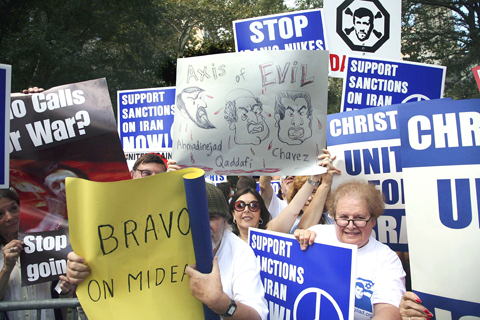China dampened expectations of further sanctions on Iran on Thursday, telling other major powers that more pressure would not persuade Tehran to halt its nuclear program.
In contrast, British Prime Minister Gordon Brown told the UN Security Council the world should consider “far tougher sanctions” if Iran continues to seek a nuclear weapon.
Both countries signed a letter on Wednesday in which the five permanent members of the Security Council and Germany told Iran to prepare a “serious response” by Thursday to demands that it halt its nuclear program, or face the consequences.

PHOTO: REUTERS
Britain, China, France, Russia and the US are the permanent members of the 15-nation Security Council.
“As evidence of its breach of international agreements grows, we must now consider far tougher sanctions together,” Brown told a council meeting on nuclear proliferation chaired by US President Barack Obama.
At the end of the two-hour session, council members unanimously approved a resolution calling for an end to the proliferation of atomic weapons, but did not name Iran or North Korea, which is also in a standoff over its nuclear program.
The US-drafted resolution called for further efforts to achieve “a world without nuclear weapons” and all urged countries to sign the 1970 nuclear Non-Proliferation Treaty.
Obama said he and Russian President Dmitry Medvedev agreed this week that additional UN sanctions would be considered if Iran doesn’t respond to proposals to end the nuclear standoff.
“We’ll be particularly telling Iran it’s got a decision to make,” Brown told the BBC before the council meeting. “It can work with the international community. We can help it get civil nuclear power, but if it persists with this course, it’s going to be isolated from the whole international community.”
The West suspects Iran’s nuclear program is aimed at developing atomic weapons. Iran insists it is limited to the peaceful generation of electricity and has rejected Security Council demands that it suspend sensitive nuclear activities.

DAREDEVIL: Honnold said it had always been a dream of his to climb Taipei 101, while a Netflix producer said the skyscraper was ‘a real icon of this country’ US climber Alex Honnold yesterday took on Taiwan’s tallest building, becoming the first person to scale Taipei 101 without a rope, harness or safety net. Hundreds of spectators gathered at the base of the 101-story skyscraper to watch Honnold, 40, embark on his daredevil feat, which was also broadcast live on Netflix. Dressed in a red T-shirt and yellow custom-made climbing shoes, Honnold swiftly moved up the southeast face of the glass and steel building. At one point, he stepped onto a platform midway up to wave down at fans and onlookers who were taking photos. People watching from inside

A Vietnamese migrant worker yesterday won NT$12 million (US$379,627) on a Lunar New Year scratch card in Kaohsiung as part of Taiwan Lottery Co’s (台灣彩券) “NT$12 Million Grand Fortune” (1200萬大吉利) game. The man was the first top-prize winner of the new game launched on Jan. 6 to mark the Lunar New Year. Three Vietnamese migrant workers visited a Taiwan Lottery shop on Xinyue Street in Kaohsiung’s Gangshan District (崗山), a store representative said. The player bought multiple tickets and, after winning nothing, held the final lottery ticket in one hand and rubbed the store’s statue of the Maitreya Buddha’s belly with the other,

‘NATO-PLUS’: ‘Our strategic partners in the Indo-Pacific are facing increasing aggression by the Chinese Communist Party,’ US Representative Rob Wittman said The US House of Representatives on Monday released its version of the Consolidated Appropriations Act, which includes US$1.15 billion to support security cooperation with Taiwan. The omnibus act, covering US$1.2 trillion of spending, allocates US$1 billion for the Taiwan Security Cooperation Initiative, as well as US$150 million for the replacement of defense articles and reimbursement of defense services provided to Taiwan. The fund allocations were based on the US National Defense Authorization Act for fiscal 2026 that was passed by the US Congress last month and authorized up to US$1 billion to the US Defense Security Cooperation Agency in support of the

HIGH-TECH DEAL: Chipmakers that expand in the US would be able to import up to 2.5 times their new capacity with no extra tariffs during an approved construction period Taiwan aims to build a “democratic” high-tech supply chain with the US and form a strategic artificial intelligence (AI) partnership under the new tariffs deal it sealed with Washington last week, Taipei’s top negotiator in the talks said yesterday. US President Donald Trump has pushed Taiwan, a major producer of semiconductors which runs a large trade surplus with the US, to invest more in the US, specifically in chips that power AI. Under the terms of the long-negotiated deal, chipmakers such as Taiwan Semiconductor Manufacturing Co (TSMC, 台積電) that expand US production would incur a lower tariff on semiconductors or related manufacturing